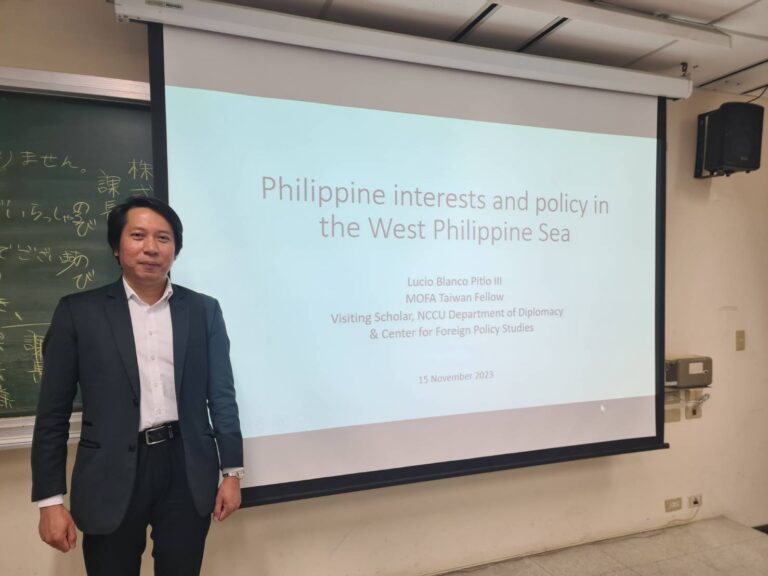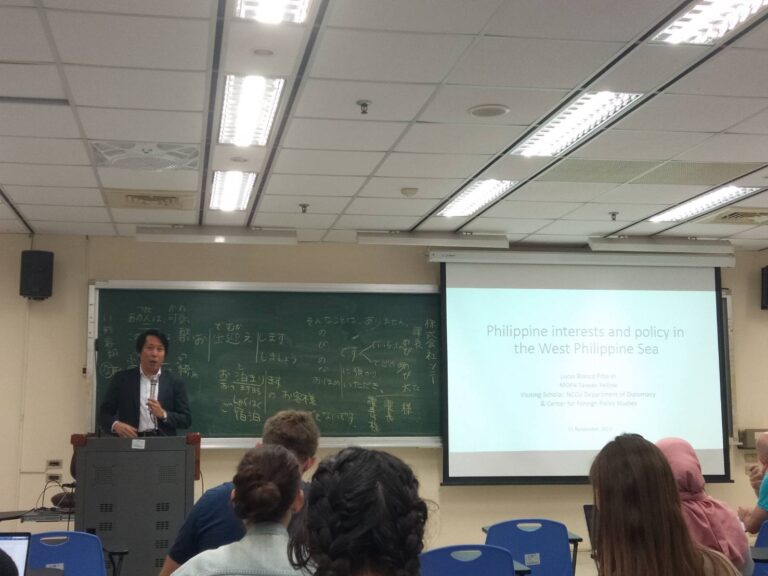【Article by College of Social Sciences】
The Relations between the Philippines and China in recent years have been dominated by territorial disputes and the militarization of features in the South China Sea/West Philippine Sea. Recent incidents have seen collisions between the Chinese Coast Guard and Philippine resupply missions. These series of maritime confrontations have strained bilateral relations, therefore, to understand the circumstances of Philippine-China relations, IDAS Assistant Professor Yuan Li-Chung invited Mr. Lucio Blanco Pitlo lll, a MOFA Taiwan Fellow and visiting scholar of the Department of Diplomacy, to provide an assessment of recent and escalating developments in Philippine-China relations that reflect growing tensions in the region on November 15, 2023. This is in line with the curriculum of the Seminar on Asia-Pacific Regional Security Studies under the International Doctoral Program in Asia-Pacific (IDAS) of the College of Social Sciences (CSS) of the National Chengchi University (NCCU).
Pitlo presents a detailed observation of the Philippine position and the considerations informing the country’s foreign policy and strategic action. Pitlo first outlines the Philippines’ interest, expanding on what is at stake in the country’s efforts to counter Chinese action. National security interests of the Philippines mainly focus on issues of national sovereignty and territorial integrity including the Kalayaan Group of Islands, part of the Spratly archipelago covered within the Philippine Exclusive Economic Zone (EEZ). The wider security agenda not only covers defense and security, but includes energy, trade, border security, food security, and much more.
While Philippine-China relations are underpinned by strong bilateral trade and development partnerships. Security ties have experienced strain, necessitating the need for repairs in the relationship to effectively handle disputes. Pitlo surmises that there was optimism of continued stability in the relationship early on in the Marcos Jr. presidency, stemming from former President Duterte’s daughter being the vice president. However, events later on would overtake this early optimism, arresting the positive momentum are multiple maritime incidents which soured the relationship, and saw the expansion and revitalization of US-Philippine relations. These coincided with regional developments that saw a hardening of military postures indicated by the increase of defense spending and the creation of new security architecture in the region.
The ongoing maritime dispute has negatively affected broader relations and has seen the Philippines adopt a strategy of “aggressive transparency”, which shed light on the gray zone tactics of China. International diplomatic support for the Philippines has followed, but Pitlo expressed concern if this will actually alter Chinese behavior. Or, it could result in China doubling its efforts to make an example of the Philippines to deter other Southeast Asian claimant states.
Going forward, Pitlo discusses the primary concerns for the Philippines which include no further occupation and military construction of the unoccupied features in the SCS/WPS. This position has been echoed by the other littoral states. Furthermore, the Philippines’ goal is for non-interference in its EEZ including the exploration of oil and gas. But most importantly, no disruption of routine resupply missions of the Philippines in its outpost in the SCS/WPS.
Pitlo concludes with a sober assessment of possible areas of cooperation to rebuild Philippine-China relations—primarily acts to depoliticize marine environment and conservation with a coordinated annual fishing ban to replenish diminishing fishing stocks. There are already existing frameworks such as the High Seas Treaty of 2023 which could foster cooperation in the sustainable use of living marine resources, including in the high seas pocket in the middle of SCS with other areas of collaboration including ocean waves and offshore wind energy, mariculture, and deep-sea mining.
In the open forum, students presented questions on regional mechanisms to safeguard peace, such as the ASEAN position on the territorial dispute. According to Pitlo, there have been efforts to resolve the issue multi-laterally, however, Beijing was unwilling to talk until it could negotiate from a position of strength. This was achieved with the militarization of island features by China. As a counterweight, Pitlo suggested that the Southeast Asian states should have a cohesive stance before approaching Beijing. This was followed by a question about Philippine-Taiwan relations. Pitlo notes that relations between Taipei and Manila are underpinned by the existing agreement on maritime law enforcement 2015, which prevents the use of force, humanitarian concern, and jurisdictional delimitation. This has resulted in no unfortunate events since 2012.


